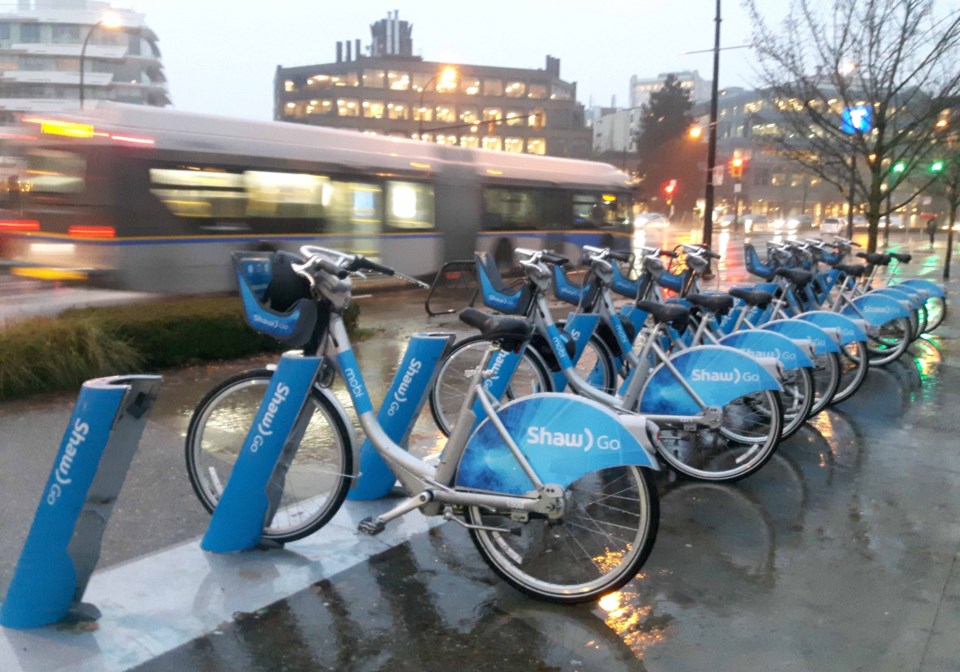I haven’t ridden a bike in this city for a few weeks now. In part, it’s because my bike – a beautiful vintage one – was stolen. Of course, the persistent and aggressive rain hasn’t helped, and the replacement bike I bought off a friend is sitting in my living room, tires deflated.
Weather not withstanding, I decided it was time that I looked into Vancouver’s bike sharing program, which I'm so happy we have. But nay, my enthusiasm was abruptly thwarted: not only does the bike share not (yet) have stations in my neighbourhood, but it’s pricing is awkward, or rather, it doesn’t meet my needs.
I decided to take my qualms to Mobi, but there again, I hit a road block: there was no media number or email on their website, and when I called the main line and selected option number five for media inquiries, I was put through to a Mobi support operator who told me he wasn’t permitted to give me a phone number, only an email address.
Despite the challenges in kick-starting my inquiry, Mia Kohout, general manager of Vancouver Bike Share, promptly responded to my request for an interview. Kohout has a background in marketing and she served as editor-in-chief of Momentum, a Vancouver-based cycling magazine, for more than a decade.
Last Friday, the city announced that Mobi would be expanding with approximately 15 new stations and 500 more bikes to cover the Commercial Drive area as far east as Victoria Drive, as well as more of Mount Pleasant and the Downtown Eastside. Providing further details, Kohout says “we're going to be beginning that rollout in 2018, with the goal of being completed by the summer.”
Kohout estimates that the expansion will cost $3 million. One million will come from TransLink’s Bicycle Infrastructure Capital Cost Sharing Fund, and Vancouver Bike Share Inc. will cover the rest.

But who and what is Vancouver Bike Share? Mobi is the forward-facing name of Vancouver Bike Share Inc., which itself is a subsidiary of Cycle Hop, a U.S. bike sharing company. Vancouver Bike Share Inc. has a contract with the city, and is obligated to fulfill certain service requirements.
Yes, those bright blue Shaw-branded bikes are a public-private partnership.
Despite the considerable public funding, signing up for Mobi requires a credit card, which is something my lower-income friends don’t have. A day pass costs $9.75, and, if you want anything more, the price jumps to $75 for 90 days of unlimited 30-minute rides, with several higher priced options available. As someone who wants to see whether Mobi is compatible with my lifestyle, these subscription options are not what I’m looking for. I asked Kohout why there isn’t a $20 one-week option for Vancouver residents.
“The goal, and really our focus is annual membership, so that's really what we push most locals to actually sign up for, because that gives you unlimited access… people who are annual members are quite satisfied with their membership, and the cost is quite low if you use it regularly.”
My frustration with a lack of trial pricing options remains, but there is some consolation. Mobi regularly offers free one-day trial passes, and there’s one on now. What luck!
But, just as I am wrapping up my bike column due to winter weather, I wondered what affect the rainy days have on the bike share program.
As it enters its second winter in operation, Mobi has in fact seen a decrease in ridership. During the winter, the number of trips taken drops by about 70 to 40 percent. According to the company’s latest numbers, August 2017 saw nearly 95,000 rides, September saw 64,208, and, by October, it dropped to 43,440.
As for myself, my cycling has dropped by 100 percent, and will likely remain there until the spring, when I hope to resurrect the Vicious Cycle column (and re-inflate those tires).
• Do you ride your bike year round? What are your strategies for surviving the weather? Follow @tessavikander on Twitter, email [email protected], or use #viciouscycleyvr to share your biking tips.



